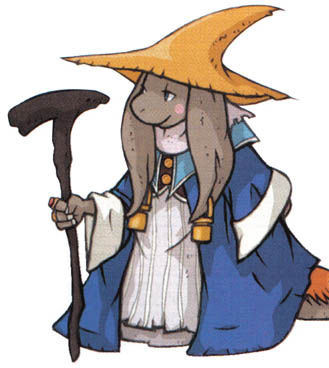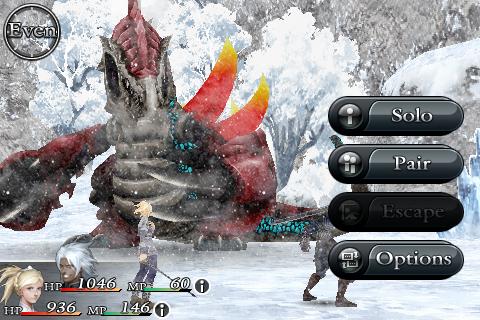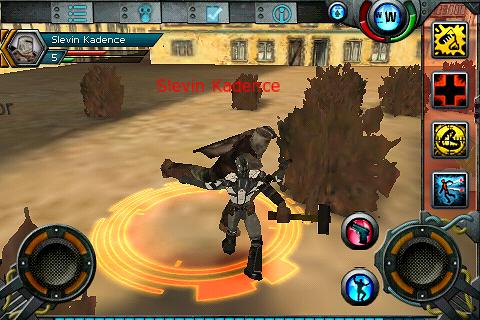The Crystal Touchscreen: What's next for role-playing games on iPhone?
Four building blocks for a phenomenal RPG

While some genres have excelled on iPhone and iPod touch, others have struggled. Tower defence flourishes, while role-playing games founder.
For every good role-playing game there exists a wretched one and much of that has to do with an adherence to outdated design paradigms. Role-playing games have grown up and expectations are high. Rehashing decades-old design isn't a winning formula.
Games like Chaos Rings prove that there's a desire for deep, high quality role-playing that takes familiar concepts and redesigns them for a new audience on iPhone and iPod touch.
Success is easier than you would expect, boiling down to four key areas - battle mechanics, quest design, character development options, and storyline. These are the building blocks for the next epic role-playing game.
In-depth, varied battle systemThe one thing that makes or breaks a role-playing game is its battle system. Even if everything else is out of place, a finely tuned, engaging combat system will keep you playing.
There's no advantage to offering either turn-based combat or real-time action - the goal is to create exciting, challenging battles.
Chaos Rings succeeds in doing just that with a simple turn-based system made unique with pair attacks and a tide of battle indicators. Ravensword: The Fallen King is enjoyable because its real-time battle mechanics make it feel almost more of an action game than a role-playing game.
The key is variety, and a gradual increase in difficulty. Crimson Gem Saga is a letdown because the battle system lacks variety. Its plain your-turn-then-my-turn battle mechanic is too rigid to be engaging. Real-time combat has its challenges, too, as Hybrid 2: Saga of Nostalgia shows.
Originality isn't necessarily the key to a great battle system, but quality design is. More time ought to be spent fine-tuning the battle system than perhaps any other part of a role-playing game.
Thoughtful quest design.jpg) Start by reducing fetch quests. It seems obvious, yet iPhone and iPod touch role-playing games continue to abuse this as a design shortcut or a means of artificially extending length.
Start by reducing fetch quests. It seems obvious, yet iPhone and iPod touch role-playing games continue to abuse this as a design shortcut or a means of artificially extending length.
Zenonia was given the benefit of the doubt since it was among the first worthwhile role-playing games for iPhone and iPod touch, but its sequel was criticised for failing to wean itself off a design heavily reliant upon fetch quests.
Axion, Xenome, Episode 1, Chronicles of Inotia, and SEED 2: Vortex of War all load up on fetch quests to their detriment.
Limiting fetch quests as optional side missions is a good starting point, but superb role-playing games possess intriguing scenarios intimately tied to story.
This means quests are dynamic with relation to the plot, which in turn yields varied gameplay because no main quest is the same as another. It's an admittedly difficult thing to accomplish, but it's a lazy game designer that settles for trite item fetching.
The easiest way of approaching quest design in a thoughtful manner is to consider breaking the dungeon formula. Rather than designing quests around dungeons that always end with a boss battle, try inserting boss battles in different places, and introducing unexpected variables during the course of a quest, such as new characters or a tempting side quest.
Incorporating interactive elements in addition to battles - mini-games, puzzles, card games, etc. - helps too.
Robust character development Most role-playing games offer moderate character customisation, but few provide the wealth of choice afforded by a top-tier title. Ravensword is role-playing in name only, providing next to nothing in the way of character development - no points for upgrading attributes, no skill tree, no unlockable abilities.
Most role-playing games offer moderate character customisation, but few provide the wealth of choice afforded by a top-tier title. Ravensword is role-playing in name only, providing next to nothing in the way of character development - no points for upgrading attributes, no skill tree, no unlockable abilities.
Successful role-playing games must learn from this example and implement an array of development systems that include options for allocating points to core attributes when levelling up, spending skill points to acquire new abilities, and equipment that can be crafted and/or augmented.
Creativity is welcome - Chaos Rings employs a neat system of genes that grant abilities when equipped. Offering a new system for learning abilities is encouraged, though not at the expense of accessibility. If it's too complex, any creativity is squandered amid confusion.
On the other hand, skill-based systems as employed by Final Fantasy II ought to be avoided since they are more punitive than rewarding. Requiring party members to take on damage to increase maximum hit points, for example, is poor design.
A compelling, understandable story As much as you may think that plot has little relevance in portable gaming, it's important. While there will always be gamers who skip dialogue and cut-scenes to get to the action, for the average role-playing fan story is central.
As much as you may think that plot has little relevance in portable gaming, it's important. While there will always be gamers who skip dialogue and cut-scenes to get to the action, for the average role-playing fan story is central.
That said, complicated narratives don't work - not on iPhone and iPod touch, and not on console. Hybrid: Eternal Whisper features a mess of a story that wouldn't have made any more sense as a PlayStation 3 title than it did on iPhone.
What works is a simple, compelling premise - Xenome, Episode 1 excels in this regard - which serves as the basis for an intriguing storyline with branching narratives that offer depth and character development.
Unfortunately, Xenome, Episode 1 fails to exploit its great premise for an interesting story. Chaos Rings is far more adept in developing its characters and fleshing out its story, yet better can be done.
A strong protagonist and equally weighty villain can help drive the story, although it's perfectly possible for an ensemble cast to do the same.
The Final Fantasy series has done wonders with ensembles packed with memorable characters, delivering some of the best role-playing games ever made. As with every story, whether in a game or movie or novel, it's about the characters and how you connect with them that defines the experience.
The take-away conceptChaos Rings comes closest to delivering the sort of triple-A role-playing experience possible on iPhone and iPod touch, yet there exists plenty of room for improvement.
There's an audience eager for fresh role-playing games, and all it takes is for a focused developer to execute on these common sense ideas to meet this demand.
Role-playing games are big, challenging projects from a development perspective, yet there's more opportunity to be seized here than any other genre due to the comparative lack of great games.
The question isn't when the next big role-playing game will appear, but who decides to step it up.
